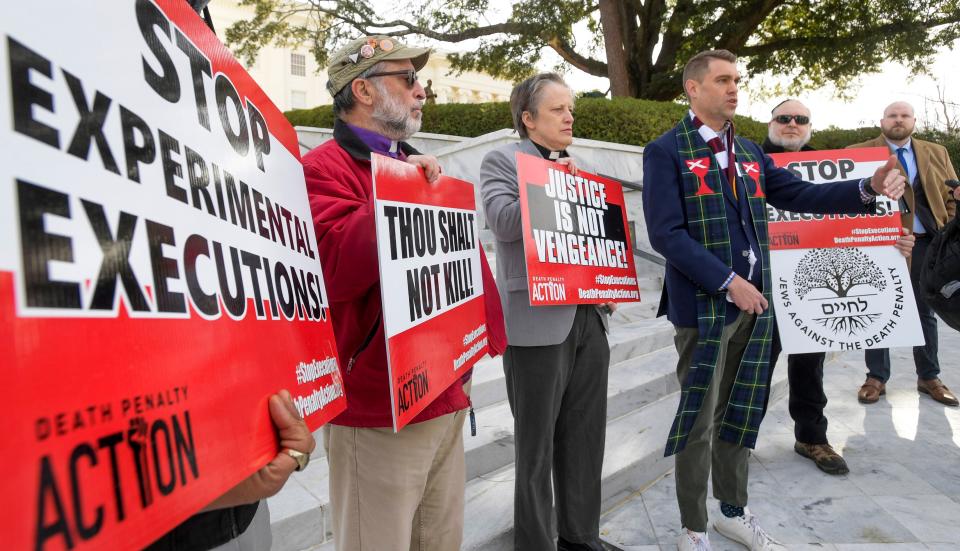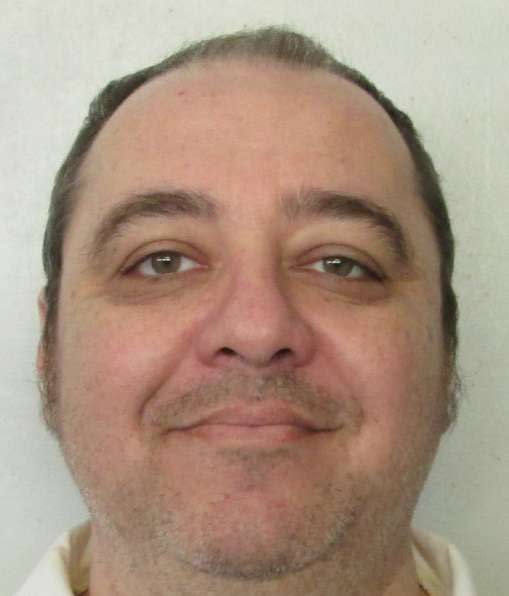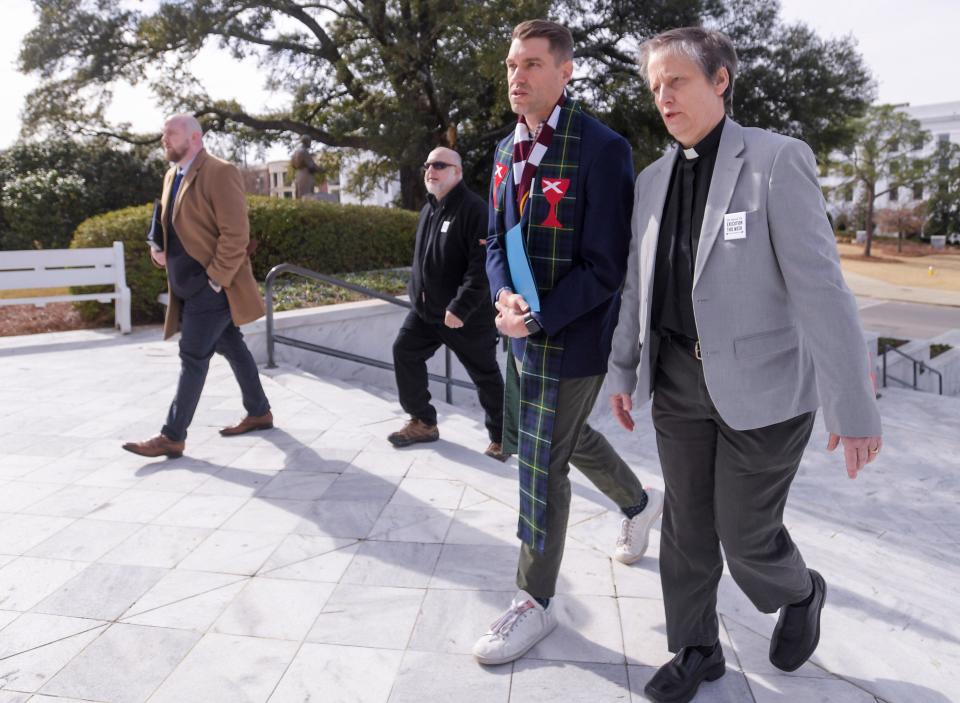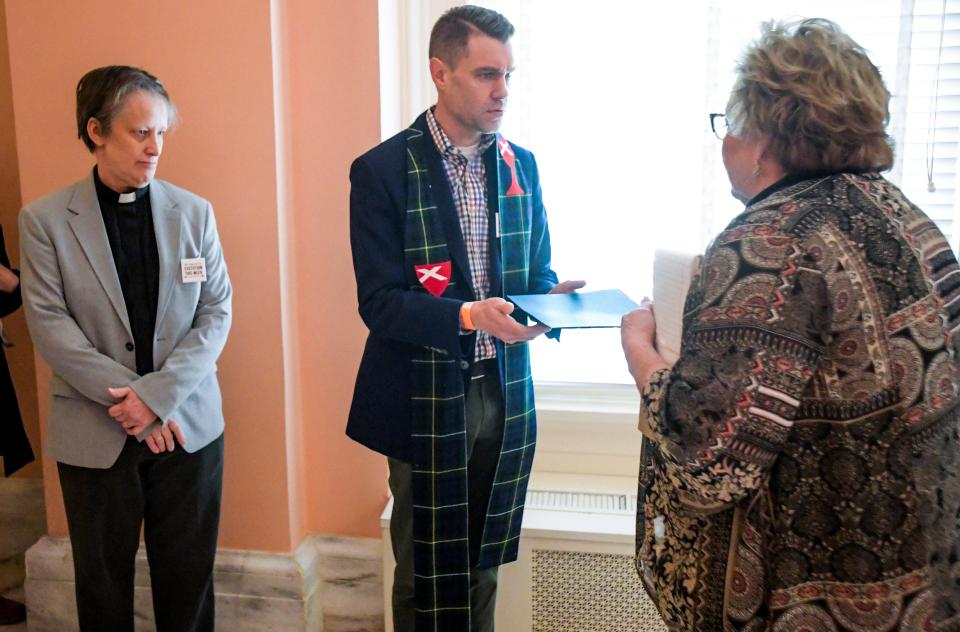Faith leaders speak out against Alabama's first nitrogen gas execution
Kenneth Eugene Smith, 58, has his second date with Alabama’s executioner this week.
The first time, the state was unable to execute Smith after failing to access his veins for a lethal injection before his death warrant expired. This time, the state will attempt a method never used on humans: Nitrogen hypoxia.
This time, Smith's death warrant runs for 30 hours from midnight Thursday until 6 a.m. Friday. He chose nitrogen hypoxia as his preferred method, an untested alternate execution method that the state approved in 2018 when it was struggling to acquire the drugs used for lethal injections.
Alabama's nitrogen hypoxia plan has drawn national and international scorn and outrage. Monday morning, a delegation of faith leaders gathered on the Capitol steps in Montgomery to protest the execution and call for its delay.
“I’m here for every execution, but this time our voices are louder because of the brutality of this method,” said the Rev. Lynn Hopkins of the Unitarian Universalist Fellowship of Montgomery. “Death is never an option, and vengeance is never justice.”

Faith leaders asked that the execution be delayed until more research could be conducted on how it would affect Smith, and they called for more transparency from the state on how the execution would be carried out.
After making short statements, the delegation turned and walked up the 51 steps to the door of the Capitol to deliver a letter to Gov. Kay Ivey’s office signed by 131 faith leaders. They expect no response to the letter due to the governor’s “… wanton lack of respect for human life,” Hopkins said.
“We are very concerned that Alabama would even contemplate this form of execution, which involves gassing people to death,” a portion of the letter reads. “How can we claim to be a state that values human life at all stages if we continue to devalue life in this manner?”
Nitrogen gas as an execution method
The state began lethal injection in 1982, but the Alabama Legislature approved the use of nitrogen hypoxia as an alternative form of execution in 2018, when it became more difficult to get the drugs used in lethal injections. The Alabama Department of Corrections has repeatedly declined to comment on the type of drugs it uses or the specific steps and protocols used in lethal injection executions.

Smith and five other inmates on death row chose nitrogen hypoxia, or asphyxia, as their preferred method of execution. The prison system hasn’t released the names of the other inmates who chose that method.
Lethal injections continued in Alabama while the state developed protocols to use nitrogen hypoxia. A federal court in 2023 approved the state’s plans for nitrogen hypoxia. That’s why Smith’s first execution attempt was by lethal injection.
Debate over cruel and unusual punishment
A federal judge in Alabama has ruled Smith's execution can go forward, but an appeal has been filed and is pending. The defense argues that the state’s specific protocol for the new method of execution could subject Smith to cruel and unusual punishment, which is barred by the U.S. Constitution.
In a heavily redacted court document, the state described the steps it plans to use. A mask will be fitted over Smith’s face, and nitrogen gas will run through the mask to displace the oxygen he breathes. The process will last either a total of 15 minutes, or until five minutes after his heart has stopped, whichever comes first.

Nitrogen is odorless and tasteless, and it makes up about 78 percent of the air we breathe. Supporters hold that increasing the level of nitrogen Smith breathes will result first in unconsciousness, then death.
The ADOC has not commented on whether Smith will be sedated before the nitrogen gas is administered. In lethal injection executions, the condemned is sedated before the compound that stops their heart is administered.
The Alabama Attorney General’s Office has responded in court documents that the use of nitrogen hypoxia would render the condemned unconscious in “seconds” and death would follow in a matter of “minutes.”
Opponents of the method call it experimental. It has never been used on humans. Mississippi and Oklahoma are the only other states that allow nitrogen hypoxia as an execution method. The American Veterinary Association disallows the use of nitrogen hypoxia as a form of euthanasia for mammals other than pigs because it causes an “anoxic environment that is distressing for some species.”

Smith's crime and changes to sentencing laws
Smith was convicted of capital murder on Nov. 14, 1989, in the murder-for-hire death of Elizabeth Sennett in Colbert County. She was the wife of the Rev. Charles Sennett, who hired Smith and his co-defendant to kill her in an effort to collect her life insurance policy.
Charles Sennett was in debt at the time. Elizabeth Sennett was stabbed to death in her home. Charles Sennett took his own life a few days after her death, after investigators began to suspect his involvement.
The jury voted 11-1 to recommend a sentence of life in prison without parole for Smith, but the judge ignored the jury’s recommendation and handed down the death sentence. At the time, judges in Alabama could override the jury’s recommendation of life without the possibility of parole and enact the death sentence. The Legislature has since removed that power.
The Associated Press contributed to this report. Contact Montgomery Advertiser reporter Marty Roney at mroney@gannett.com.
This article originally appeared on Montgomery Advertiser: Faith leaders rally against gas execution of Kenneth Eugene Smith

